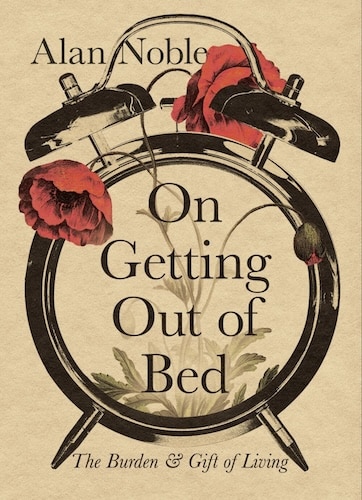Adapted from Ch 4 of On Getting out of Bed.
Why is Existence Good?
Living for the sake of living—doing things so that you can continue to efficiently do things—begs the question, Why live?
To live.
That isn’t a sufficient answer.
Now or sometime in the future that answer will fall flat for you or someone you love. The mere fact that you can cope with great suffering is not in itself a reason to cope with it. So when we encourage depressed and anxious people to be active, get out of the house, and stay busy just so that they’ll feel good enough to stay busy, we may help them get out of a funk, but we aren’t helping them understand the goodness of their existence. Don’t do the next thing just so that you can keep doing the next thing. Do the next thing because it honors God and testifies of His goodness and the goodness of your life to your neighbor.
Building Momentum
Moments create momentum. When you choose to do the next thing, neither accepting nor denying the anxiety or depression you carry, you create the momentum that makes the next, next thing a bit easier to manage. And the converse is true. When you cannot do the next thing, everything becomes harder to manage.
When your days are filled with mundane tasks, none of which are worth posting on social media or even talking about, it can feel impossible to build momentum, to feel like your life is going anywhere for any purpose. This is precisely why we must see that each choice to do the next thing is an act of worship, and therefore fundamentally good. Feeding your pets is an act of worship. Brushing your teeth is. Doing the dishes. Getting dressed. Going to work. Insofar as each of these actions assumes that this life in this fallen world is good and worth living despite suffering, they are acts of faith in God. Choose to do the next thing before and unto God, take a step toward the block. That is all you must ever do and all you can do. It is your spiritual act of worship.
The practice of getting out of bed, facing the day, and honoring God with your actions is also part of the definition of love given by the apostle Paul in 1 Corinthians. We are most used to hearing these verses read during weddings, as they are a beautiful reminder of the nature of love. Practiced rightly, love turns out to be a great challenge to our egos:
Love is patient and kind; love does not envy or boast; it is not arrogant or rude. It does not insist on its own way; it is not irritable or resentful; it does not rejoice at wrongdoing, but rejoices with the truth. Love bears all things, believes all things, hopes all things, endures all things. (1 Corinthians 13:4‑7, ESV)
While these verses are a wonderful reminder of how all married people ought to act toward their spouse, the implications are much broader. They apply to our relationships with friends and even strangers. But here I’d like to suggest something a little different. If this definition of love is accurate, then it also communicates something about the way we ought to interact with God Himself, and therefore how we ought to think about His creation, which includes us. It teaches us how to love ourselves.

On Necessary Self Love
If you flinch a little at the idea of loving yourself, I urge you to reconsider. I also cringe a little at this concept. To my ears, it sounds a little too similar to the tautological, vacuous positive thinking and self-esteem talk that I grew up around: you should love yourself because it’s important to love yourself. But we should not let the abuse of a concept obscure its truth.
It was only when I read the work of the Christian philosopher Josef Pieper that I became convicted that I really must love myself, that it is an offense to God not to love myself. Pieper describes love as the act of saying, “It’s good that you exist; how wonderful that you are!” And that is true about God’s attitude toward us. We know that He delights in our existence because He created us! So how could we not echo His “It is good” by also loving ourselves, by affirming that it is lovely that we exist?
Of course, this does not mean that we always feel pleasure in our lives, or happiness, or delight in our existence. But even when we feel despair, depression, or anxiety, we can know that it is good that we exist, and act on that knowledge. We love ourselves because we are lovely before God, and what other opinion could possibly matter more than God’s? I believe that 1 Corinthians gives us some concrete examples of how we can echo God’s delight in our existence by loving ourselves.
Applying 1 Cor 13 to Yourself
Consider what the description of verse seven means for the way we view our lives: “Love bears all things, believes all things, hopes all things, endures all things.” To love myself, my neighbor, and God, I must bear all things. Not only all the wrongs and offenses caused by my spouse, family, or even strangers, but also the sufferings I experience internally. The ones brought on by mental illness or the circumstances of life. I bear up under the suffering, resting on God and those closest to me, because in bearing with suffering, I love God by loving myself. And I model for my neighbors how they ought to also love themselves. Similarly, I must believe all things. Maybe most relevantly, I must believe God’s love for me is greater and more perfect than my imagination, that He does not make mistakes. That belief is not countermanded by my experience, my emotions, or the opinions of others.
To love myself I must hope all things. This hope is founded on the promises of God, not on my own ability to fix myself or control my circumstances or solve the problems of the world. My hope is in God’s promise to preserve me, to work all things together for my good, to finish the good work He started in me. And finally, to love myself properly, I must endure all things—including the torments of my own mind. I may tremble at the agony of life. At times I may feel crushed and overwhelmed and undone, but to love God, I must love myself; and to love my neighbor, I must love myself; and to love myself, I must endure.
I cannot do this alone, however. I bear, believe, hope, and endure not from my own capacity for love but with the aid of the Holy Spirit and with the comfort and encouragement of my friends. It is only with the aid of others that I can love myself and thereby honor God’s creation.

Adapted from On Getting Out of Bed by Alan Noble. ©2023 by Alan Noble. Used by permission of InterVarsity Press. www.ivpress.com.

Alan Noble (PhD, Baylor University) is associate professor of English at Oklahoma Baptist University. He has written for the Atlantic, Vox, The Gospel Coalition, Christianity Today, and First Things. He is also the author of On Getting Out of Bed, Disruptive Witness and You Are Not Your Own.
On Getting Out of Bed: The Burden & Gift of Living
by Alan Noble
When struggling with depression or anxiety, just getting out of bed can be challenging. Drawing on personal experience, Alan Noble considers the unique burden of everyday life in the modern world. Sometimes, he writes, the choice to carry on amid great suffering—to simply get out of bed—is itself a powerful witness to the goodness of life, and of God.
As a bonus, if you purchase one of the books above, you help support The Pastor’s Workshop at no extra cost to you. As an Amazon affiliate, TPW receives a small comission from purchases through these links.
Don’t Miss
The Latest From Our Blog
New Site Launches Tomorrow!
Watch this Space! Tomorrow (May 29) is the official launch of the new The Pastor's Workshop site! Return to this blog tomorrow morning for a post highlighting the new features and explaining how subscribers can get on and start using the site! Here are some new...
How You Can Prep for Pentecost
This was originally posted on May 12, 2016 on https://huffpost.com Pentecost Came Like Wildfire I'm lying on an ice pack early this morning, doing my back exercises and listening to Pray as You Go, a tool for meditation, with monastery bells, music, and a Bible...
Sacred Spaces: the Church Forests of Ethiopia
Let's Go to Ethiopia! Here’s a fun exercise with a spiritual payoff. Go to Google Maps and view aerial images of the South Gondar zone of Ethiopia. Use this button:When the page loads, you'll see a light brown countryside, mostly farmland. There are thin lines of dark...





